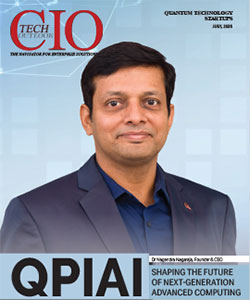The India Story at GPAI: Government and Industry Pioneering Inclusive AI
CIOTechOutlook Team | Friday, 27 December 2024, 10:38 IST
 At a time when AI adoption has become the norm and advancements in technology continue to redefine human intelligence, the Global Partnership on Artificial Intelligence (GPAI) stands as a crucial multilateral initiative. Since its launch in 2020, GPAI has bridged the gap between theoretical AI advancements and practical applications, engaging stakeholders across four key areas: responsible AI, data governance, the future of work, and innovation and commercialization. The partnership’s goal is to foster the responsible development of AI while addressing its inherent challenges.
At a time when AI adoption has become the norm and advancements in technology continue to redefine human intelligence, the Global Partnership on Artificial Intelligence (GPAI) stands as a crucial multilateral initiative. Since its launch in 2020, GPAI has bridged the gap between theoretical AI advancements and practical applications, engaging stakeholders across four key areas: responsible AI, data governance, the future of work, and innovation and commercialization. The partnership’s goal is to foster the responsible development of AI while addressing its inherent challenges.
Earlier this year, India assumed the lead chair of GPAI, championing a critical cause: AI for all. For a nation with over a billion people and immense geographic diversity, AI adoption presents not just unparalleled commercial potential but also the capacity to transform lives across education, employment, healthcare, and beyond. At the GPAI Summit in Belgrade, Serbia highlighted AI’s transformative potential for emerging economies and its profound implications for India.
India's leadership in technological innovation is driven by the Hon'ble Prime Minister's vision of democratizing AI across the nation. This vision has spurred remarkable initiatives, including the development of indigenous AI capabilities and Indic-language AI tools like BHASHINI, which bridge language gaps to foster greater accessibility and inclusivity. This success is symbolized by India’s global leadership in AI skill penetration, its position as the second-largest contributor to GenAI projects, and a 95% increase in its project contributions, ranking third globally.
The progress of AI in India is rooted in robust government support through strategic policies such as the India AI Mission, which has allocated over ?10,300 crores ($1.24 billion) to establish a thriving AI ecosystem. This mission encompasses the development of indigenous Large Language Models (LLMs), scalable AI systems, governance frameworks, deep tech startups, and AI education initiatives. These measures are key to fostering innovation across sectors.
However, building AI systems necessitates vast volumes of data, which is increasingly generated by internet-based technologies in diverse sectors, including stock exchanges, financial services, manufacturing, telecommunications, healthcare, and academia. AI systems also produce new information, such as classifications or predictions. The data used to train these systems, along with the data they generate, is highly diverse in format and nature.
This raises a crucial question: where is this data sourced from? While some of it stems from international practices and contributions by Indian developers, a significant challenge lies in addressing India’s unique linguistic, cultural, and socio-economic diversity. Without comprehensive, region-specific datasets, AI models risk failing to address challenges unique to India effectively. Building a comprehensive public asset database enriched with indigenous datasets is essential to enhance the accuracy and relevance of AI solutions, enabling startups and developers to innovate in ways that truly reflect and cater to India’s diverse population.
Achieving this goal requires not only the right skills but also adequate infrastructure. This is why a cornerstone of the government’s effort is the planned IndiaAISuperCompute capacity, which includes a supercomputer with at least 10,000 GPUs to support the sovereign development of Large Multimodal Models (LMMs) and domain-specific foundational models. Complementing this initiative is the IndiaAI Innovation Centre, which focuses on leveraging edge and distributed computing for optimal efficiency. Additionally, funds are directed toward key initiatives such as the IndiaAI Startup Financing mechanism, which accelerates commercialization for startups and industry-led AI projects. The IndiaAI Datasets Platform receives funding to enhance public sector datasets, while the IndiaAIFutureSkills program aims to improve access to AI education by establishing Data and AI Labs nationwide, especially in areas beyond major cities.
GPAI Discussion also led to share that parallel to these government-led efforts is the transformative #DataDaan campaign by AI4India, an initiative aimed at creating a repository of publicly accessible datasets to propel AI innovation in India. By inviting contributions from individuals, businesses, academic institutions, and government bodies, it fosters a diverse and inclusive data pool that reflects India’s geographical, linguistic, and socio-economic diversity. Such inclusivity is critical for developing AI models that are accurate and representative of India’s diverse population. By creating AI models capable of understanding and generating content in multiple Indian languages, the campaign aims to bridge these gaps, fostering a more inclusive digital future where everyone benefits from AI advancements.
As India progresses toward Prime Minister Narendra Modi’s vision of a Viksit Bharat by 2047, leveraging AI is essential not only for technological advancement but also for fostering inclusivity, sustainability, and equity. Thoughtfully applied, AI can bridge socio-economic divides, empower marginalized communities, and elevate the nation’s creative potential. At the summit in Belgrade, it was heartening to see India recognized not only for its technological innovations but also for its policy leadership in using AI for societal benefit. The GPAI Summit truly helped reinforce my belief that India must go beyond big tech and develop Indigenous models and use cases that will bring opportunities for not only Indians but the world.
About the Author: Shashi Shekhar Vempati
Mr. Vempati is a distinguished thought leader in technology and policy, with a notable background as Co-Founder DeepTech for Bharat Foundation (AI4India.org). Former CEO - Prasar Bharati (DD&AIR). An Infoscion and IITB alumnus. Author of 'Collective Spirit, Concrete Action - Mann kiBaat and its influence on India". Recently he was representing India at GPAI- 2024 in Serbia.




